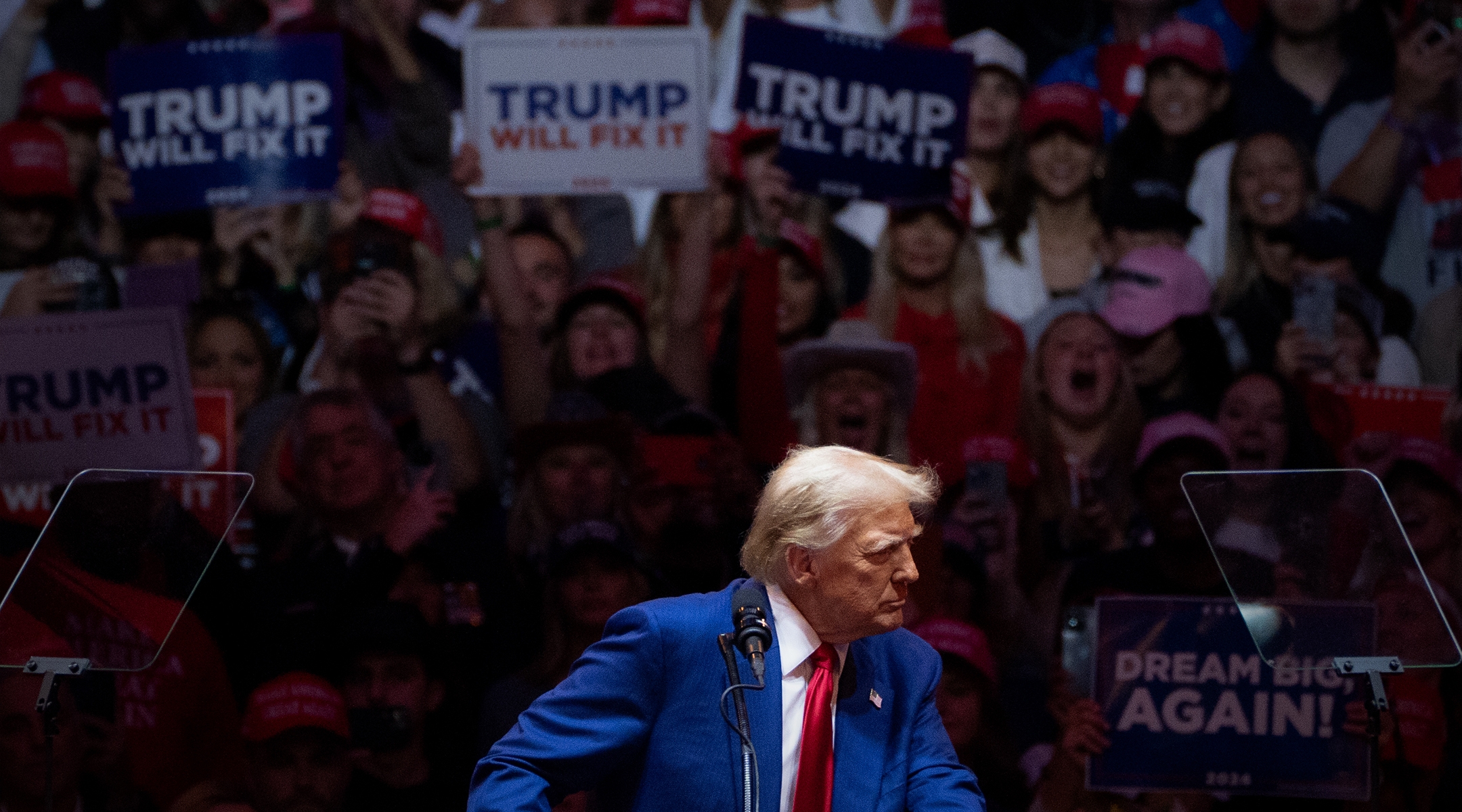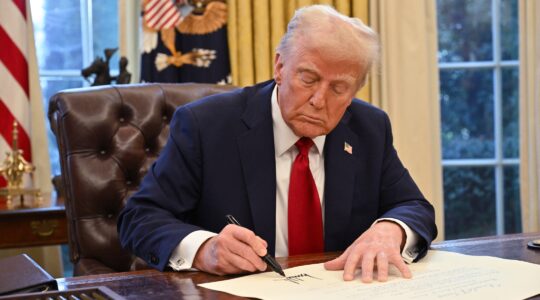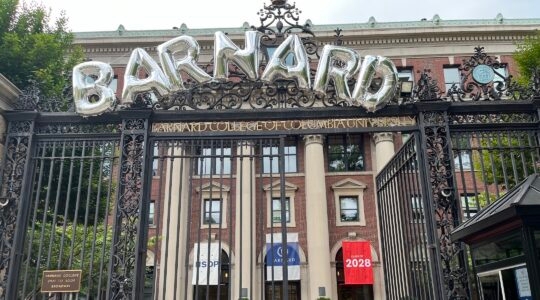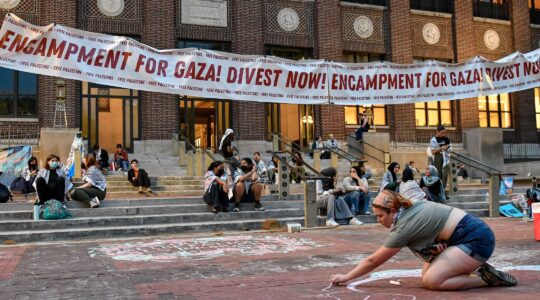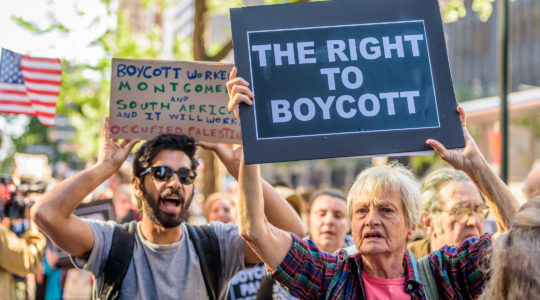When Jonathan Greenblatt used his platform as the CEO of the Anti-Defamation League on Monday to condemn a certain act of bigotry, his longtime predecessor atop the ADL, Abe Foxman, took notice — not just of what Greenblatt said but also of what he didn’t say that day.
In a post on X, formerly known as Twitter, Greenblatt joined a chorus of voices condemning a conservative commentator for implying on-air that a fellow guest on a CNN program was a member of Hezbollah. Meanwhile, Greenblatt was silent on the day’s much larger topic of discussion: Donald Trump’s rally at Madison Square Garden, which many, including Foxman, saw as a grotesque spectacle of antisemitism, racism, xenophobia and misogyny.
“I’m reluctant to criticize my successor, but, hello, he went after this guy on CNN yesterday, and couldn’t mention Trump, it’s a little bizarre,” Foxman, who led the ADL for decades and has endorsed Democratic candidate Kamala Harris, told the Jewish Telegraphic Agency.
Foxman likened Greenblatt to Jeff Bezos, the head of Amazon and owner of the Washington Post, which announced last week it wouldn’t make an endorsement in this year’s presidential election. The decision, made by Bezos, broke with decades of precedent and was widely interpreted as driven in part by a fear of antagonizing Trump.
“It’s the same syndrome, it’s not just the Stockholm syndrome — call it the Washington Post syndrome,” Foxman said.
Foxman also broadened his critique to a slew of major American Jewish organizations that he said have abdicated their duty by refraining from speaking out about Trump’s rally.
“There’s no question about it: For the American Jewish Committee, the ADL, Conference of Presidents, the federations, all these institutions, if this happened six months ago, they would be out there condemning racism and antisemitism and hate speech,” he said. “So I’m troubled.”
Foxman was weighing in on a delicate balancing act that nonpartisan Jewish groups face during every election season. While their missions do not change, rising tensions can make some actions or statements run the risk of appearing partisan. This election adds to the mix a former president with a track record of remembering all of his critics, and who has vowed to use the power of the presidency, should he regain it, to retaliate against them. Trump has also said that if loses the election, Jews who didn’t vote for him would be to blame.
For the ADL, the response to the rally was a statement posted by the group’s official account that didn’t name Trump or the Republican party.
“Political rallies should be about politics and policy, not offensive jokes that denigrate Jews, Palestinians, Puerto Ricans, and other marginalized groups,” the ADL said in a tweet posted Monday morning. “In a moment when hate has surged and when tensions are high, there’s no place for bigotry or intolerance on the campaign trail, full stop. We expect more and hope for better in these last days before the election.”
A senior Biden administration official expressed surprise that a tweet which did not name Trump was as far as the ADL was willing to go.
“While those of us in the Biden administration understand that organizations like ADL don’t want to endorse candidates, we would think the type of event that happened a few days ago would compel a historic organization like the ADL to comment,” said the official, who asked not to be named in order to speak frankly.
“They tiptoed around the fact that it wasn’t a random event in a closet, it was a Trump campaign rally at Madison Square Garden with thousands of people,” the official added. “The only thing worse than the ADL not commenting was their comment. What’s the point of the ADL if you’re not going to condemn this when it happens?”
An ADL spokesperson said it was clear who the target of the tweet was. The tweet included a link to a Washington Post story about the rally.
“ADL clearly condemned the Trump Madison Square Garden rally and the antisemitic, racist, and bigoted comments that occurred,” the spokesperson told JTA.
The ADL’s decision to avoid naming Trump also drew derision from Jewish groups and figures on the left. “ADL — it was a Trump rally,” Randi Weingarten, the president of the American Federation of Teachers, who has held lay leadership positions in a number of liberal Jewish groups, wrote in a reply.
“Dear ADL and @JGreenblattADL, We’re prepared to assist your $100 million dollar operation in identifying ‘the campaign,’” offered Bend the Arc: Jewish Action, a social justice group which has endorsed Harris.
These reactions to the ADL highlight how the group’s approach to Trump and bigotry from the right has noticeably changed in recent years. The ADL was among the most outspoken voices challenging Trump before and during his term as president, including when it called for his removal from office following the riot at the U.S. Capitol on Jan. 6, 2021, that was aimed at overturning his electoral defeat. A pivot also took place in the ADL’s relationship with Elon Musk, the world’s richest person, who owns the social media platform X and has since emerged as one of Trump’s most important benefactors and supporters.
The group has continued to criticize Tucker Carlson, the former Fox News host who recently invited a Holocaust denier on his talk show on X and who spoke at the Madison Square Garden rally, but also did not name him in its criticism of the event.
The shifts came over a period when it became clear that Trump would rebound from his 2020 loss and the 2021 riot and reenter politics, and as Greenblatt appeared to pivot his focus when publicly discussing threats facing Jews. Greenblatt announced in 2022 that he believed opposition to Israel on the “radical left” was the “photo inverse” of antisemitism from the far right. They also came as some American Jews have felt increasingly alienated from the left following the Oct. 7, 2023, attack on Israel and the ensuing war in Gaza, which were accompanied by a spike in antisemitism around the world.
Daniel Lubetzky, the billionaire businessman who sits on the ADL’s 22-member board of directors, exemplifies this shift. In 2020, shortly after joining the board, he exhorted political moderates like himself to support Democrat Joe Biden. On Tuesday, with criticism of the ADL swirling, he said he supported neither candidate while sharing a video from Batya Ungar-Sargon, a Jewish pundit and self-described opponent of “wokeness,” explaining why Trump was better for Jews and arguing that critiques of his rhetoric were misguided. Other members of the ADL’s board are publicly supporting Harris.
Foxman and the groups he is criticizing as wrongly reluctant to call out Trump fall on different sides of a debate roiling Jewish leaders. This close to Election Day, many communal Jewish organizations have traditionally been reluctant to do anything that would appear partisan.
A spokesperson for the Jewish Federations of North America, a group representing 400 Jewish communal umbrella organizations, articulated the more cautious approach in a statement to JTA.
“It’s critically important for the Jewish community to work in a bipartisan manner and have good relationships regardless of what party controls the White House, the Senate, or the House,” the spokesperson said. “This close to the election, we believe it is important that we not appear to have our thumb on the scales for either candidate, and let people make their own informed choices at the ballot box.”
Prompted by a request for comment, the AJC said that it cannot as a nonprofit organization endorse candidates or political parties and released a one-sentence statement noting that Trump and other Republican leaders have distanced themselves from some of the messages at the rally.
“It is important that the Trump campaign and many in the leadership of the Republican Party disavowed the offensive and divisive rhetoric from some of the speakers at Sunday’s rally,” the statement from an AJC spokesperson said.
Some nonpartisan Jewish groups that are left-leaning have made a different calculation, arguing that it’s their job to call out antisemitism and that they should not avoid speaking up even when doing so could be seen as favoring one side or the other of the political map.
Among the Jewish communal leaders who publicly condemned rhetoric emanating from the Trump campaign are Jill Jacobs, the CEO of T’ruah; Jeremy Ben-Ami, the president of J Street; Jonah Pesner, director of the Religious Action Center of Reform Judaism; and Amy Spitalnick, CEO of the Jewish Council for Public Affairs.
“We need to be calling out antisemitism, hate and extremism, no matter where it exists and no matter where it comes from,” Spitalnick told JTA. “If there were a Democratic presidential candidate doing the same, we would also call it out in the same way.”
JTA has documented Jewish history in real-time for over a century. Keep our journalism strong by joining us in supporting independent, award-winning reporting.
